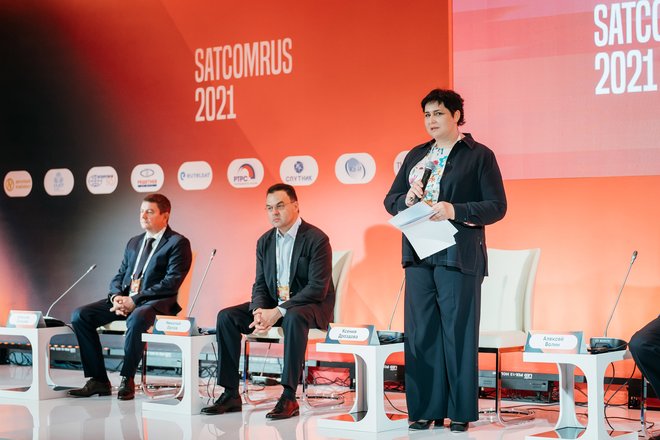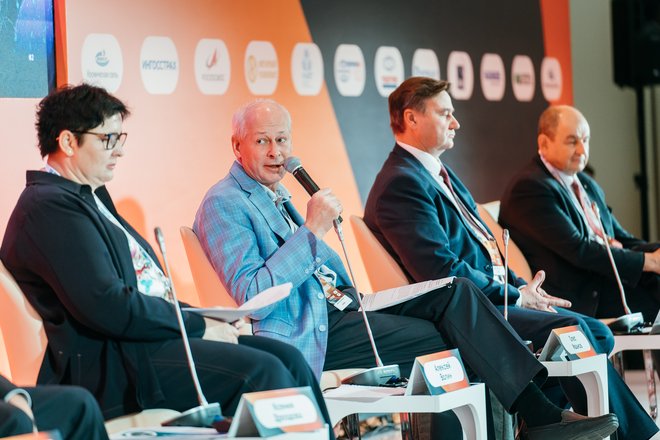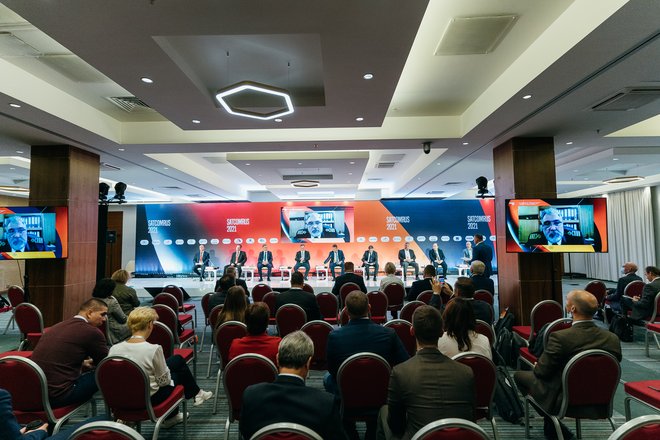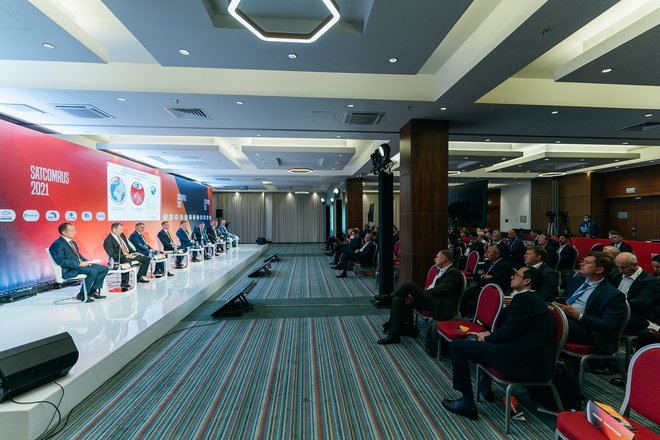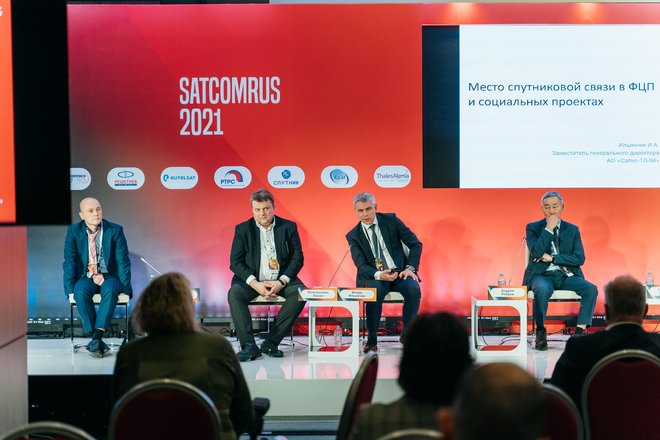Satellite through the life: SATCOMRUS-2021 conference attendee discussed the future of the satellite industry
During four sessions, the participants shared their vision of the satellite market’s future in the context of active development and launch of low-orbit constellations. According to Alexey Volin, General Director of Russian Satellite Communications Company, with each launch of LEO satellites, traditional industry representatives have more and more questions and concerns about the future of satellite communications. But at the moment there is no reason for concern: everyone will be able to occupy a certain niche and provide their services.
“Space communications co-exists with fiber optics, broadband access and mobile communications. These have been supplemented with new market participants – low-flying constellations that will solve their own task. Somewhere we will divide the market, somewhere we will compete, but each of us will have our own niche,” stated Alexey Volin.
He also added that traditional operators would be ready to lend their shoulders when the low-flying satellite market hit a crisis that was almost inevitable at the early stages of development and they were unable to meet customer demand.
“Any new business, after a sharp rise at the start, experiences a recession. And then it is not always able to come out of the "dead zone". Our business has passed this test long ago. And how investors (of LEO projects) will react to the first “bursting bubble”, instead of the promised super-profit, is a big question. We are ready to watch what is happening with our colleagues and, when required, lend our support to those who will be left without communication and provide them with our traditional services,” noted General Director of RSCC.
Alexey Volin also spoke about the company's plans to launch two new satellites – Express-AMU3 and Express-AMU7 – by the end of the year: the start can take place in December, after which, in 2022, they are expected to reach the 103 °E and 145 °E positions, respectively. In addition, RSCC plans to launch four highly elliptical satellites Express-RV, which in 2025 will increase the service area of the constellation from 79.8% to 90% of the Earth.
Regional Vice President of Eutelsat S.A. in Russia Nikolay Orlov, in turn, spoke about the recent deal, which allowed to increase the stake in British-Indian OneWeb to 30%. At the same time, Eutelsat also does not consider it as a competitor to the company's current business and geostationary satellites in particular.
“Our main areas are television and radio broadcasting, as well as fixed broadband access services and further development of high capacity satellites. OneWeb has a source of growth outside of broadband broadcasting services”, Nikolay Orlov said.
The future of the satellite industry will also be shaped by new technologies. This, in particular, was told by Nikolay Testoedov, General Director of ISS Reshetnev Company JSC. Now, for example, there is a great need for IoT services – for meteorological stations, agriculture, monitoring of housing and utility services, etc. According to him, multi-satellite systems of a new type will be used in many areas in the future. This means a hybrid of the existing and fundamentally new systems.
“The harmonized common satellite system, which continues to evolve and is created by new orbital constellations, is a combination of stationary, highly elliptical, medium circular and low circular orbits,” Nikolay Testoedov explained.
Ksenia Drozdova, General Director of Intersputnik IOSC, agreed with him: new technologies and the possibility of using multiple orbits will ensure rapid development of the industry.
“We will use all the possibilities – multiple orbits, the symbiosis of access to space resources and facilities, and multiple services. For example, we are currently in the process of transferring data to the "clouds". The nearest project we are working on is “cloud spaces” for TV and radio broadcasters who are most willing to transfer their services,” said the head of Intersputnik.
Ashot Bakunts, the regional director of Thales in Russia, also discussed how new technologies affected the satellite services market: “Today we live in the period of transformation, a shift in emphasis. New technologies appear and, unfortunately, the market for classic, analog communication systems is starting to collapse.” However, according to him, there is also a window of opportunity associated with flexible technologies, and the share of new satellites with flexible payload is steadily growing.
In addition, according to General Director of FSUE NIIR Oleg Ivanov, both manufacturers and operators will gradually switch to high capacity satellites: in the future, a massive transition to HTS is inevitable. However, according to research, the prospects for the Russian market are not so bright compared to other regions of the world. “We must do everything to ensure that these forecasts do not come true. The projects that are currently in progress give serious hope for this,” said Oleg Ivanov.
The head of the European analytical agency Euroconsult, Pacôme Révillon, in turn, also drew attention to the development prospects of 5G networks: “Most likely, here we should expect active development of events in mid 2025. Now, it is important to create the technological ground in order to meet the demand that will come from 5G networks. I believe this will have a serious impact on the business from an economic point of view."
Summing up, Aleksey Galakhov, Deputy General Director for Corporate Business of Ingosstrakh Insurance Company, noted that none of the space-related activities could exist without insurance. And now the main task for insurers is to present, together with partners, the space industry as "a transparent, reliable, well-managed, promising business with a predictable accident rate”. It is also important for them to become objects of digital transformation themselves: “We’ll get to the point where we can use artificial intelligence to calculate the likelihood of accidents, rates, etc. and this is not a question of the distant future, but of tomorrow."
In addition, the conference participants discussed the reduction in the construction time and cost of satellites, investments in the industry, the creation of the 6G standard, the features of marine, land and air transport communications, as well as research, plans, development and results of the satellite industry. Speakers at the event were also Minister of Innovation, Digital Development and Infocommunication Technologies of the Republic of Sakha (Yakutia) Anatoly Semenov, Head of the Representative Office and Regional Director of Hughes Network Systems in Russia and the CIS Konstantin Lanin, Director of Information Technologies of Rosatom Evgeny Abakumov, Deputy General Director of Gilat Satellite Networks (Eurasia) Mikhail Pykhov and other well-known representatives of the market. For the first time in the history of the conference, captain of the nuclear powered icebreaker Dmitry Lobusov contacted the participants in real time. He described how the broadband satellite access was changing the daily life of ship crews.
After the discussions, a solemn ceremony of awarding the winners of SatComRus Award 2021 took place. The second day of the conference was devoted to business negotiations.
